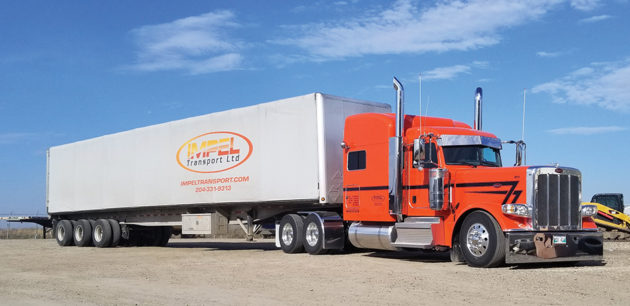Continuing to ‘Impel’ his company forward

 WINKLER, Man. — The trials and tribulations of owning and running a trucking company is not lost on Neil Hamm.
WINKLER, Man. — The trials and tribulations of owning and running a trucking company is not lost on Neil Hamm.
After launching Impel Transport in 2002 and enjoying some initial success, the economy hit back, forcing Hamm to reconsider the direction of Impel and steer the carrier in another direction.
In the beginning, Impel was a dry van carrier hauling loads to the Midwestern U.S., and ended up building a profitable less-than-truckload network coming back into the Canadian Prairies.
But the Great Recession in the U.S. had a significant impact on Impel, shrinking its fleet from 14 trucks to six. In addition to the U.S. economy, Hamm said freight in Alberta mostly dried up, and the LTL business dramatically changed, forcing him to rethink his business plan.
“In 2008 we saw some opportunity in the open deck business,” said Hamm. “We purchased a couple of step decks, and basically started over. Today, we are running 30 trucks on the deck side, and eight to 10 trucks on the van side, growing with our customers and growing our customer base.”
In total, Impel runs 40 trucks, the majority being owner-operators. The company has a diversified fleet, with dry vans, reefers, Conestoga trailers, flat and step decks, and RGN trailers. The company is back running its dry van division into the U.S. and Canadian Prairies, and their open decks go coast to coast in Canada and the U.S. Impel hauls a variety of motorized equipment, such as recreational vehicles and construction equipment, as well as building materials.
With an ingrained entrepreneurial spirit as an owner-operator, Hamm started Impel after losing his contract with a company he was leased to when it unexpectedly closed its doors.
“I had been at several trucking companies and it seemed to me like the attitude and culture was always the same, and I just thought there had to be a better way,” said Hamm. “So the goal was to start a company where drivers and the office would work as a team with mutual respect; where everyone is a human being first no matter your title or position.”
That attitude has led to continued success for Hamm and his company. Impel’s fleet has grown more than 60% over the past two years due to what Hamm said was increased demand from existing customers and adding new accounts to their portfolio.
They have also created a fully licensed and bonded third-party logistics division giving Impel the ability to be there for its customers in areas the company doesn’t necessarily service on a regular basis with its own equipment.
Hamm has been on top of the electronic logging device (ELD) mandate for some time, transitioning to the new technology two years ago so they were fully compliant with U.S. regulations.
Hamm said he has heard all the negative comments regarding ELDs from drivers and owner-operators, but he has not seen any change in productivity from a business standpoint.
With a myriad of issues in the industry needing to be addressed in the coming years – ELDs, recruitment and retention, infrastructure, driver shortage – Hamm said differing laws from province to province is what concerns him most.
“Because we travel coast to coast it can be a huge challenge to satisfy the multiple sets of regulations as we travel through various jurisdictions, especially when hauling larger equipment,” he said.
Increasing fuel efficiency is another area where any trucking company owner worth their weight would like to see improvements, as it would help their bottom line.
Often, conflicting rules in each province or jurisdiction can impact how efficient a fleet can be.
“There are a ton of regulations and some that are so archaic that no one even knows why they exist, but are still enforced,” said Hamm. “This prevents us from spec’ing efficient equipment that can be used across Canada.”
Hamm admits there are enough trucking companies out there that if one were to disappear, few people would take notice.
But with the manner in which Impel has conducted its business, Hamm believes this would not be the case for his company.
“Truthfully, the only thing that sets us apart from any other trucking company out there is our culture,” said Hamm.
“When you see a turnover rate of less than 10%, I really believe we have a formula that is working, and this obviously filters all the way through.”
Have your say
This is a moderated forum. Comments will no longer be published unless they are accompanied by a first and last name and a verifiable email address. (Today's Trucking will not publish or share the email address.) Profane language and content deemed to be libelous, racist, or threatening in nature will not be published under any circumstances.